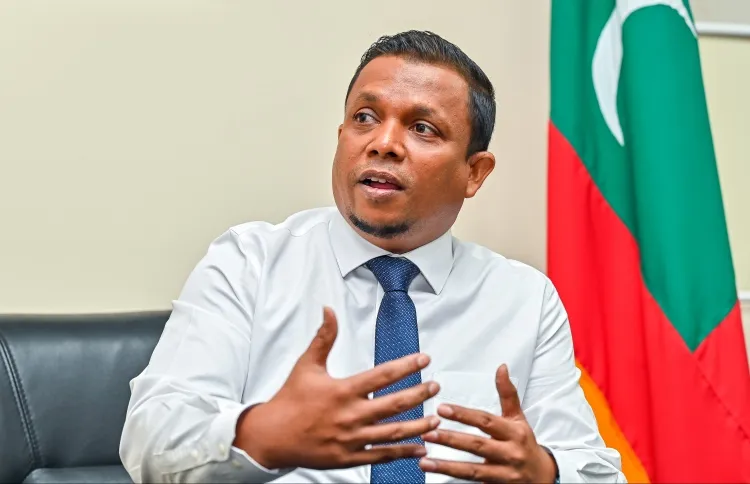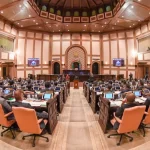MALÉ, Maldives — In a small, cluttered shop in the heart of Malé, Ahmed Rasheed, 42, meticulously arranges imported goods on shelves that seem to grow emptier by the day. His furrowed brow reflects the anxiety gripping many Maldivians. “Everything is getting more expensive, but my income stays the same,” he said. “I worry about how I’ll pay my rent and find USD for my child’s MBBS expenses in Malaysia. It’s nearly impossible to get USD now, and even if it’s available on the black market, the rate is much higher.”
Rasheed’s unease is symptomatic of a broader economic crisis threatening the Maldives’ once-thriving economy. Known for its luxury resorts and pristine beaches, this tropical paradise is now grappling with a less idyllic reality: a mounting debt crisis that threatens to upend its economy.
In response, President Dr. Muizzu’s government has unveiled a sweeping fiscal reform package, aiming to steer the country away from the brink of financial collapse. Although the ambitious and far-reaching government reforms are widely discussed among policymakers in Malé, they have yet to instill confidence in the average citizen, who remains concerned about the struggling economy and skeptical of the government’s economic measures. Furthermore, those few who have been reached for this story are largely unaware of the government’s fiscal reform agenda.
This skepticism is underscored by the staggering figures: public debt in the Maldives reached $8 billion in 2023, representing a staggering 122.9% of GDP. Without significant fiscal adjustments, this debt is expected to balloon further, jeopardizing the country’s economic sustainability.
Finance Minister Dr. Mohammed Shafeeq, addressing the Majlis Finance Committee last week, painted a stark picture of the challenges ahead. “We’re facing debt repayments of $100 million by 2025 and an additional $500 million in 2026,” he said. Without immediate action, the country risks on its obligations.
The situation is further complicated by substantial debt servicing obligations. The country faces average annual payments of $512 million for 2024 and 2025, with a dramatic spike to $1.07 billion in 2026.
The broader economic indicators offer little comfort. Real GDP growth, which surged to 13.9% in 2022 as tourism rebounded post-pandemic, is expected to moderate to 4.7% in 2024. Inflation is projected to climb to 7.5% in 2024, up from 2.9% in 2023, adding pressure to household budgets like Rasheed’s.
The fiscal balance remains stubbornly in deficit, projected at 12.2% of GDP in 2024. While the debt-to-GDP ratio is expected to slightly decline to 122.1% in 2024, it’s a far cry from sustainable levels.
In response to these challenges, the Muizzu administration has crafted a comprehensive fiscal reform strategy. At its core, the plan aims to reduce government spending by an average of 1.1% annually while simultaneously boosting revenue and grants by 10.9% over the medium term.
The strategy is multifaceted, said the minister, focusing on both spending cuts and revenue enhancements to close the fiscal gap.
A central element of the reform is the increase in foreign exchange revenue. Among the key components of the reform package is a proposed increase in the Airport Development Charge (ADC) and the green tax, initiatives aimed at bolstering government revenues amid rising fiscal pressures. Additionally, the administration will focus on expanding and reviewing existing tax structures. This includes adjustments to the Goods and Services Tax (GST), import duty rates, and corporate income tax for telecom operators. There will also be revisions to tourism land rent and taxes on alcohol.
The reform package further proposes a range of other measures designed to strengthen fiscal stability. This includes increasing duties on unhealthy products, revising GST administrative laws, broadening the tax base, and diversifying economic activities. A significant aspect of the plan is to boost deposits into the Sovereign Development Fund, which is intended to provide a financial cushion for the country’s future needs. Without these crucial fiscal adjustments, the country’s economic sustainability remains at risk.
The government has set ambitious targets, aiming to reduce direct debt to 95% of GDP by 2026, keep the budget’s direct debt below 5% of GDP annually, and ensure recurrent expenditure doesn’t exceed government revenue.
Minister Shafeeq was quick to reassure citizens that the reforms are not intended to burden the average Maldivian. “Our intention is not to increase GST, Tourism GST, Business Profit Tax, or withholding tax for ordinary citizens,” he emphasized.
This balancing act — increasing revenue without overburdening citizens — is at the heart of the government’s strategy. The focus on foreign exchange revenue, particularly from the tourism sector, is crucial for a country whose debts are primarily denominated in dollars.
If successful, the government projects these reforms could significantly alter the country’s fiscal landscape. By 2026, they anticipate revenue reaching 44.3 billion rufiyaa, compared to 38.3 billion without reforms.
The expenditure side tells a similar story. With reform measures, the government expects to spend 45.5 billion rufiyaa in 2026, compared to 55.2 billion without reforms. This trend continues through 2028, with projected spending of 49.2 billion rufiyaa with reforms versus 59.8 billion without.
More critically, the debt-to-GDP ratio is expected to decline to 103% by 2026 and further to 93.8% by 2027, a marked improvement from the current trajectory.
However, the path to fiscal stability is not without its hurdles. Critics argue, however, that the reforms may not go far enough. They highlight the need for deeper structural changes to reduce dependency on tourism and build resilience against external shocks. Additionally, there is concern that without a reduction in recurrent expenditures, particularly in terms of political appointees, the effectiveness of these reforms could be undermined.
Others worry about the potential impact on local businesses and employment if corporate taxes and import duties rise significantly. The tourism industry, which forms the backbone of the Maldivian economy, will need to remain competitive despite potential increases in taxes and fees.
Interestingly, the government’s strategy also touches on public health concerns, particularly around tobacco use. With annual cigarette imports valued at $400 million and youth smoking rates alarmingly high — increasing from 11.2% to 45.7% in 2019 — increased duties on tobacco products serve both fiscal and public health objectives.
The World Health Organization estimates that an average of 150 people die each year in the Maldives from diseases caused directly by tobacco use — roughly one every two days. This public health angle adds another layer to the complex tapestry of the reform package.
International financial institutions have expressed concern about the Maldives’ fiscal trajectory. The reforms appear to be a direct response to these warnings, aiming to demonstrate fiscal responsibility to both domestic constituents and international creditors.
The World Bank, in particular, has warned that without significant adjustments, the country’s debt could rise to unsustainable levels in the medium term, threatening the nation’s economic stability.
As the Maldives embarks on its challenging journey of fiscal reform, the business community is watching with cautious anticipation. Ali Fauzy, owner of a hardware chain stores in Male’, embodies the cautious optimism felt by many in the business community. “We’re walking a tightrope,” Fauzy says. “These reforms could either propel us forward or set us back years.” Like many, Fauzy is particularly concerned about potential increases in taxes and fees. “Our tourism product need to remain competitive globally,” he explains, “but we also understand the government’s need to increase revenue.” Fauzy’s situation mirrors the broader challenges facing the Maldives – balancing fiscal responsibility with economic growth. The success or failure of these measures could serve as a case study for other small, tourism-dependent economies grappling with debt in the aftermath of global crises. For Fauzy and his peers, the stakes couldn’t be higher. “Our businesses, our employees’ livelihoods, and the future of our country all hang in the balance,” he says, his voice a mixture of concern and hope.
For citizens like Ahmed Rasheed, the true test of these reforms will be felt in daily life. “I hope the government knows what it’s doing,” he said, glancing at his modest shop. “We can’t afford any more hardships. But if these changes mean a better future for my children, maybe it’s worth it.”
Minister Shafeeq’s words to the Majlis Finance Committee resonate with both hope and urgency: The path ahead is challenging, but with these reforms, we are charting a course towards a more stable and prosperous Maldives. For Ahmed Rasheed and thousands of other Maldivians, the success of these reforms could mean the difference between hardship and hope.












